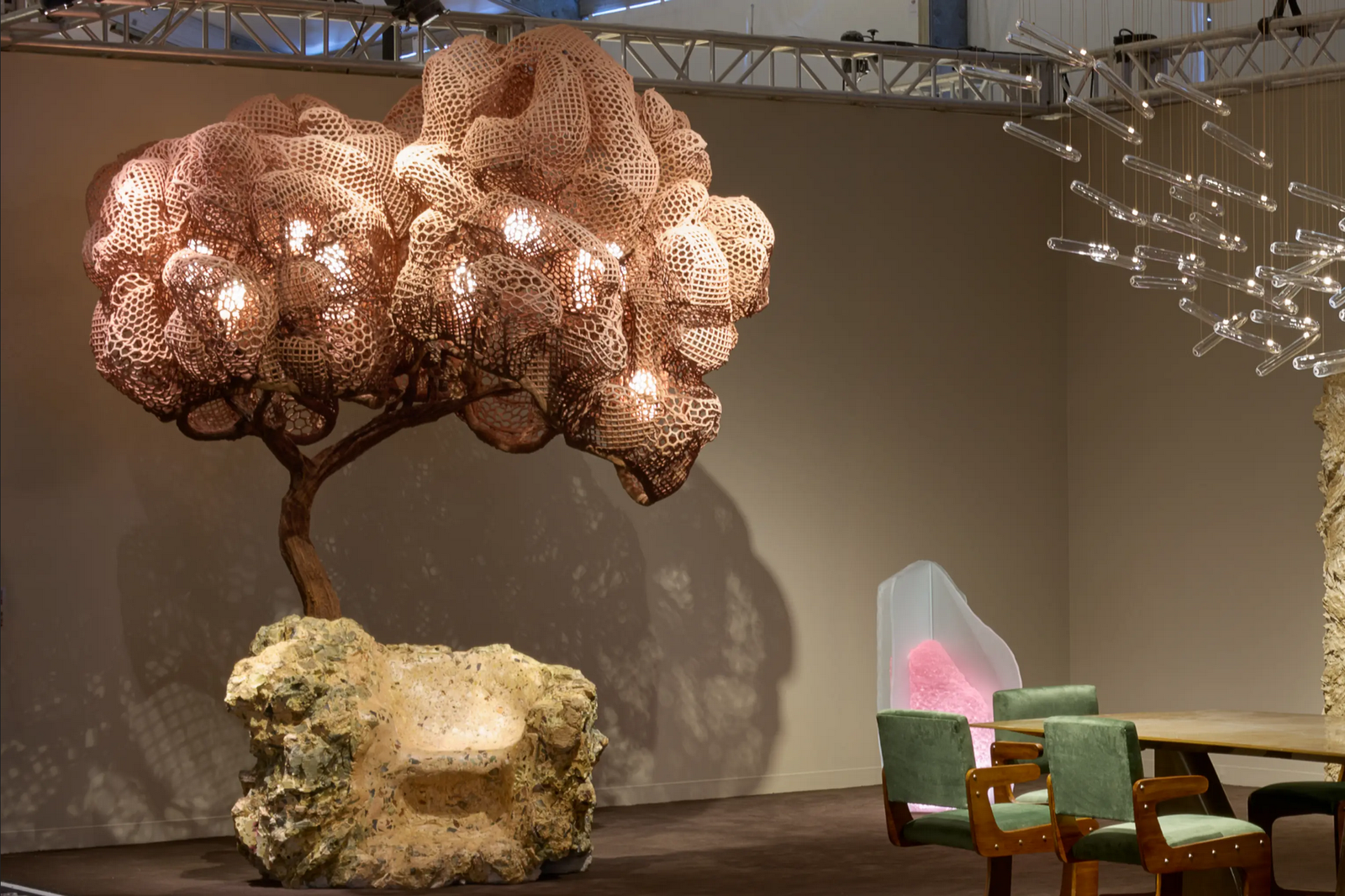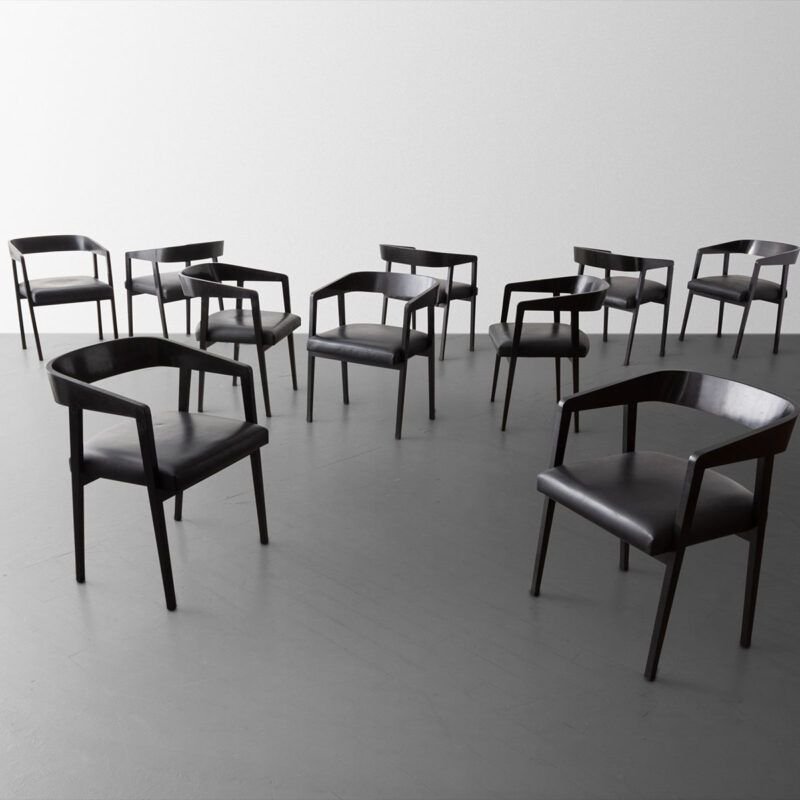The Curator’s Award for this year goes to Nifemi Marcus-Bello‘s Omi Iyo, presented by Marta Gallery.
The Best Gallery title was awarded to London’s Gallery FUMI for their enchanting display of sculpted forms that evoke a whimsical fantasy land. Artists VoukenasPetrides, Max Lamb, Jeremy Anderson, and Lukas Wegwerth contributed to the mesmerizing presentation.
The Best Curio Award was given to Raise the Moral (Los Angeles) for their exhibition called “Becoming Familiar,” featuring artwork by Moral Turgeman and Kelsey Falter.
S.A.M. Tropique no. 503 Table by Jean Prouvé, 1951, at Patrick Seguin (Paris) won The Best Historic piece award.
Nacho Carbonell‘s One-Seater Concrete Tree at Carpenters Workshop Gallery (London/Paris/New York) was the Best Contemporary piece.
Finally, the best special project went to Villa Albertine and the Mobilier National. They presented an exhibition curated by Alban Roger with an immersive installation by Atelier d’Offard, showcasing the work of five rising stars of the French design scene: Atelier George, Atelier d’Offard, Chloé Bensahel, Gala Espel, and Dimitry Hlinka.

Nacho Carbonell’s One-Seater Concrete Tree (2022) at Carpenters Workshop Gallery’s booth.
FOCUS ON BRAZILIAN DESIGN
Carpenters Workshop Gallery
Carpenter Workshop Gallery’s booth featured pieces by Brazilian designer José Zanine Caldas (1919-2001). Renowned for his Móveis Denúncia – protest furniture, he drew inspiration from the local craftsmanship and natural resources of the region. His notable large wooden pieces were frequently crafted from a single tree trunk. Throughout his career, Zanine Caldas maintained a profound engagement with Brazilian craftsmanship and natural materials, a fundamental aspect that permeates the essence of all his creations.

Zanine Caldas, Dining Chair (Set of 12), circa 1950.Plywood Wood, Upholstery (TBD), 50 x 75 x 50 cm.Asking Price $84.000
R & Company
R & Company presented pieces by Joaquim Tenreiro (1906-1992). He is a pioneer of modernist Brazilian furniture making. His finely crafted artworks evoke a sophisticated fusion of traditional and contemporary styles, closely tied to Brazilian culture.

Joaquim Tenreiro, Dining table, c.1961.Ebonzied imbuia with black under-painted glass top, 297 L x 109 W x 73.6 H cm.Asking Price $300.000

Joaquim Tenreiro, Set of ten (10) dining chairs,1960s.Ebonized wood and leather, 53 L x 54.6 W x 70.5 H cm.Asking Price $150.000
Diletante 42
Diletante 42 (São Paulo), committed to supporting Brazilian designers, presented Lina Bo Bardi’s Chaise Model E 1 (1949). By skillfully using wood and rope, Lina Bo Bardi chose not to include upholstery, which improved ventilation and adaptability, showcasing her clever adaptation of simple materials. The gallery’s stand also featured a massive wooden table by José Zanine Caldas.

Lina Bo Bardi, Chaise Model E-1,1949.Wood and rope, 140 x 50 H x 60 cm.Asking Price $220.000

Lina Bo Bardi & Giancarlo Palanti, Chaise Model C-3, 1949.Wood and rope, 80 x 60 H x 60 cm.Asking Price $80.000

Jose Zanine Caldas, Zanine Dining Table, 1979.Juerana solid wood, 246 x 92 x 74 cm.Asking Price $95.000
Mercado Moderno
For Design Miami 2023, Mercado Moderno brought a curation of classic pieces of Brazilian Modernism, including furnitures by Joaquim Tenreiro.

Joaquim Tenreiro, Armchair, 1960s.Wood and fabric, 73 H x 72 x 88 cm.Asking Price $25.000

Joaquim Tenreiro, Pair of armchairs, 1958.Wood and cane, 66 H x 69 x 65 cm.Asking Price $42.000
In conclusion, Design Miami reflects a notable inclination towards tribal inspiration, evident in its curated selection of materials, particularly showcasing fabrics and ceramics. This deliberate choice mirrors the overarching ambiance of the market, emphasizing a trend towards the use of warmer and more organic materials. The fair not only serves as a showcase of innovative designs but also highlights the industry’s evolving preference for materials that evoke a sense of connection to nature and cultural influences.